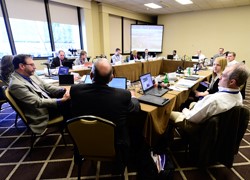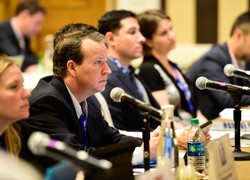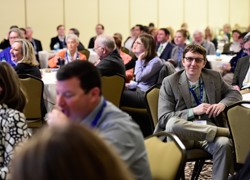Takeaways from Spring Leadership Meetings

Thank you for participating in a very productive set of leadership events in sunny Seattle. For your reference, all business meeting agendas are posted in the leadership section of the website.
APA Board of Directors
The Board took these actions:
- Directed staff to establish an online, members-only photo-sharing library. We will share implementation details before launching this new member benefit later this year.
- Approved the Diversity Task Force's proposal for a pilot re-launch of the Ambassadors Program, including metrics to measure its success. A nationwide rollout may be considered in the future.
The Board considered the final reports and recommendations from four of the ten Development Plan Task Forces appointed by Board President William Anderson, FAICP: Planning Office of the Future, Economic Development, Smart Cities and Sustainability, and Water. The reports offer insights into the changing profession and include far-reaching recommendations. They will be reformatted as white papers and shared with members and partners on social media and in APA Interact.
The Board continued strategic conversations on the future of the Planning Advisory Service and the Sustaining Places Comprehensive Plan Standards Program.
AICP Commission
The Commission:
- Considered a new draft of a strategic plan. The Commission will seek additional feedback from leaders in the months ahead.
- Reviewed the Certification Maintenance fee structure and provider review process, including a proposal to increase provider fees by 15 percent to help cover program costs.
- Reviewed progress on a pilot program on the AICP credential in China.
Committee reports to the commission included an update on the Comprehensive Planning Exam, an Ethics Committee concept for an alternative code process, and College of Fellows Committee recommendations on a career advice task force.
Chapter Presidents Council
The CPC agenda included:
- Discussion of all chapters adopting a percentage-based dues system within the next three years. There will be additional discussions while the CPC Executive Committee moves forward with this proposal.
- Chapter grants awarded to:
- National Capital — $4,000 for "Celebrating Our Legacy, Anticipating Our Future"
- Northern New England — $5,400 to continue "New Ruralism – We Know It When We See It"
- Texas — $2,200 to implement "Texas Emerging Planning Leaders"
- $10,400 remains available to be awarded to chapters in 2015's second grant cycle.
- Task force reports:
- The Leadership Task Force said that a survey of chapter presidents identified four major needs: more networking opportunities; more chapter leadership training that presidents can pass on to members; defining the CPC's role in APA and its interactions with the APA Board and AICP Commission; and CPC committee structures and utility.
- The Communications Task Force — created and charged last fall with improving communications and workflow between the chapters and other leadership groups — launched a free chapter conference calling system and produced a calendar of important events and items due to and expected from APA National.
The CPC Topical Exchange included discussions of:
- Engaging students and new professionals
- Best lobbying and advocacy practices
- Planning for leadership transition
- Motivating your board
- Communicating with members
- Strategies for increasing membership
Divisions Council
The Divisions Council:
- Rejected a proposal to offer unlimited free division memberships to participants in APA's Early Career Membership Program and created a task force to examine possible alternatives.
- Announced that $3,000 in grant funding is available in FY 2015 for one or two divisions to conduct research.
- Discussed Divisions Council Initiatives, including an update on "Aging and Livable Communities," a proposed 12-month plan to enhance "Planning for a More Dynamic Population," and a possible new initiative, "Smart Cities and Sustainability."
- Recognized outgoing division chairs, including Timothy Brown, AICP (County Planning), DC Vice Chair David Fields, AICP (Transportation Planning), Robert Kerns, Jr. (Sustainable Communities), Anna Kitces, AICP CEP (Planning and Women) and Patrice Ruffin, AICP (Planning and the Black Community.
- Welcomed new division chairs: Fiona Akins, AICP (Planning and Women), Catherine Duffy, AICP (Transportation Planning), Megan Nelms, AICP (County Planning), Scott Turner, AICP (Sustainable Communities), and Zunilda Rodriguez, AICP (Planning and the Black Community).
APA Executive Director James Drinan facilitated a discussion on how to grow and stabilize small divisions, ensure accountability from volunteers, maintain a strategic focus, plan for leadership succession, and manage the challenges of working remotely.
Division/Chapter Connections
At a roundtable dinner, chapter and division leaders considered CPC/DC collaborative efforts. Their lively discussions resulted in many suggestions, including:
- A joint focus on legislative goals for initiatives
- A shared article database
- A shared database of ready-to-go sessions
- Joint development of "plug and play" webinars
- Joint networking opportunities, such as conference happy hours
- Peer exchanges
- Cross marketing
- Connecting chapter affinity groups and divisions
- Profiling divisions in chapter newsletters and interviewing division leaders
- Crowdsourcing a list of speakers based on attendee reviews
The Division-Chapter Liaisons, Libby Tyler, FAICP, for the Divisions Council and Greg Toth, AICP, for the Chapter Presidents Council, will develop these ideas and others identified in the Task Force Collaboration Report.
SRC Executive Committee
The SRC EC discussed:
- Publicizing the upcoming election of student representatives for 2016-17, including targeted outreach to Planning Student Organization representatives and on social media
- Soliciting student feedback on APA's new Development Plan
- Creating a strategic plan for the SRC Executive Committee
- Providing support to the APA/AICP Student and New Planner Task Force. Region II Representative Thomas Hamed is a task force member.
- Helping PSOs plan events for Infrastructure Week
Following recent changes to SRC bylaws, sitting SRC EC members will serve a two-year term, until December 31, 2015. Previous SRC ECs served for only one year.
Return to June issue of The Washington Planner
|





